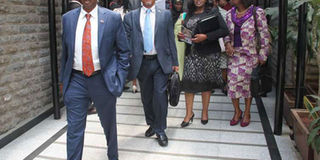IEBC bosses strike Sh200m sweet deal to leave office

Independent Electoral and Boundaries Commission chairman Issack Hassan (left) with other commissioners at Parliament Buildings on August 3, 2016. The commissioners have resolved to go home following a public loss of confidence in their ability to manage the 2017 General Election. PHOTO | JEFF ANGOTE | NATION MEDIA GROUP
What you need to know:
- Commission chairman Ahmed Issack Hassan said after a closed door meeting in Parliament that the nine commissioners were ready to go home.
- Each of the other commissioners said they supported the resolution, saying they had served Kenya honourably.
- Fourteen-member parliamentary committee on electoral reforms will now focus on how to recruit the next lot of election chiefs.
Electoral commissioners on Wednesday agreed to leave office as long as they are paid all their salaries and allowances, ending a long drawn-out dispute championed by opposition politicians who have been gunning for their removal ahead of next year’s General Election.
On the final day of hearings by the joint Senate and National Assembly committee formed to decide the future of Independent Electoral and Boundaries Commission (IEBC), an agreement was reached that the commissioners be allowed a dignified exit.
Commission chairman Ahmed Issack Hassan said after a closed door meeting in Parliament that the nine commissioners were ready to go home to end the impasse created by Cord’s insistence that they leave.
Each of the other commissioners said they supported the resolution, saying they had served Kenya honourably and were only offering to leave because of politics.
The deal was the culmination of closed-door meetings over two days between the commissioners and the committee co-chaired by senators Kiraitu Murungi and James Orengo.
The commissioners said they had prepared well for the General Election and urged that the IEBC secretariat staff be allowed to continue with the job.
NEW RECRUITMENT
The agreement means that the 14-member parliamentary committee on electoral reforms will now focus on how to recruit the next lot of election chiefs if Parliament agrees on a negotiated settlement for the outgoing commissioners.
Cord’s position has been that the electoral commission should be composed of representatives of political parties while Jubilee favours a selection panel to recruit the commission made up of representatives from the Law Society, Public Service Commission and religious organisations represented by a Catholic, a Protestant and a Muslim. A law pending in the National Assembly proposes that the Majority and Minority parties nominate two people each to the panel.
Mr Orengo said the committee will retreat to put the report and possible amendments to the law together to beat the August 12 deadline by which they should have concluded their mandate.
He said the committee would consult other agencies as it works out how to come up with the settlement to give the team a dignified exit.
Religious leaders, the Attorney General and the Commission on Administrative Justice (CAJ) had backed a negotiated settlement to end the stand-off.
Mr Hassan and his team had said they would not mind facing a tribunal, or tribunals to investigate each of them, if the lawmakers opted for it.
After a final meeting yesterday at the County Hall, Mr Orengo and Mr Murungi formally asked the team whether or not they would accept a deal if one was tabled.
“We need to approach this issue from the broader perspective of early preparation for the elections and not dwell on legalistic issues,” said Mr Murungi.
The Treasury recently said it would be ready to pay the commissioners Sh200 million from the Contingency Fund if they left office, which means they will now earn their salaries up to November 2017 as well as a gratuity.
“We should not focus too much on the headlines tomorrow but on history,” said Mr Hassan. “If there is a political settlement to be raised, the commissioners will not be a stumbling block.”
Each of the commissioners put their agreement on record, saying they concurred with Mr Hassan.
“We have served the country with honour and we appreciate the good work of the committee,” said Lillian Mahiri-Zaja, the vice chairman.
“I can confirm that what our chairman has said is what we agree with. We will not be a stumbling block,” added Mr Thomas Letangule.
Mr Mohammed Alawi said: “I want to confirm what chairman has said. I will not stand in the way of a dignified settlement.”
Mr Kule Galma Godana concurred, adding: “This country needs to invest in institutions and not bring them down whenever there is a problem. If it is necessary that we provide a solution so that this country moves on, I have no problem.”
Mrs Muthoni Wangai said “We shall not stand in the way of a political settlement. This commission has done its work well.”
Albert Bwire described himself as a nationalist and said he agreed with his colleagues as Mr Yusuf Nzibo, who served on the Interim Independent Electoral Commission weighed in: “We have served with dignity and we will leave with dignity. I leave with my head held high.” Mr Abdullahi Sharawe he agreed with everyone and the conference ended with handshakes.





